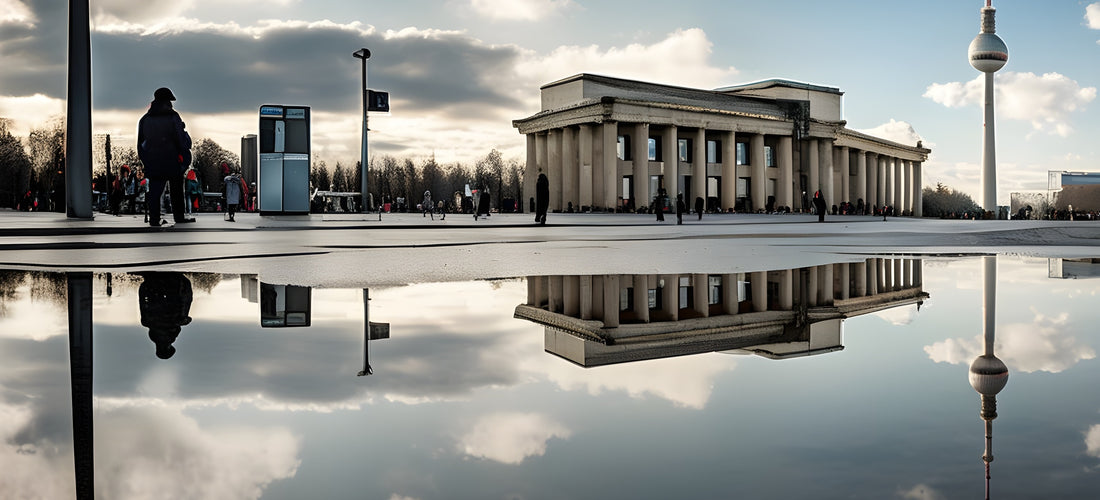Do we show respect and appreciation to our fellow human beings? Are a person's character and solidarity with one another worth less than the size of an individual's bank balance? What do we believe in? What consequences can silence have in a conformist society?
Many serious questions that the Berlin author Rainer Grebe explores in a humorous way. His book “Berliner Spiegelblicke” was recently published and is ideal as school reading material for secondary school.
Author interview with Rainer Grebe
In your new book “Berliner Spiegelblicke” you address important life questions from the perspective of a Berliner. Where do your anecdotes and stories come from?
Anyone who, like me, was born during the Second World War, spent their youth in the GDR and spent many years of their life during the “Cold War” in a divided city like Berlin, must – I think there is no other option – deal with a few traumas . I found a way with my autobiographical short stories. The questions about how carefully we treat each other and all the other questions that determine our everyday lives then quickly arise as if by themselves.
Did you feel like you were an East or West Berliner during the time of German division?
I always felt like an overall Berliner, even before the fall of the Wall. My aim is to confront broad, preconceived opinions with arguments and to fight against clichés about the GDR but also about the old FRG. To this end, I designed the current volume of anecdotes as entertaining and instructive school reading material.
You have also worked as a crime writer in the past. Does Berlin also play a role in your crime novels?
In my three previously published crime novels, old West Berlin and German history in the 1960s form the local and historical framework. Without wanting to sound presumptuous, I see myself in the tradition of authors like Horst Bosetzky and Volker Kutscher. Her novels do not rely on the description of bloodthirsty orgies of violence, but rather they embed their criminal cases in the milieu of their city of Berlin and the contemporary history of our country.
What do you hope for Berlin in the future – from social, cultural and political aspects?
I hope that people in our country look at my city openly and without prejudice. It would be a nice idea for me if at some point my compatriots would also be proud of their capital with the same level of pride that we see every day among the French, English and many other nations. In the eyes of many, Berlin is still synonymous with the ideology of the Third Reich. Berlin is simply the place in our country where the political elites of our people implement the voters' mandate. This city and its citizens are in no way responsible for how well or how poorly our representatives succeed in this task. However, as long as the mayor of a small town that is barely larger than a medium-sized district of this city is allowed to publicly trash his own capital to the applause of half the republic, something is fundamentally wrong here.
The interview was conducted by Christian Leeck. Machine translated from German.
Wuppertal, March 2024.
Berlin locations and events
The following locations and events are mentioned, among others: Köpenick, Potsdam, Seelenbinderstrasse, Bellevue Park, Schöneiche, Pankow, Zeiler Weg, Wilhelm Pieck School, Rosa-Luxemburg-Gymnasium, Reinickendorf, Bertha-von-Suttner High School, Charlottenburg, German Opera in Bismarck-Strasse, Waldbühne, Olympic Stadium, Zehlendorf, Glienicke Bridge, Berlin-Mitte, Gendarmenmarkt, Friedrichstrasse, Schiffbauerdamm, Schumannstrasse, Kreuzberg, Möckernstrasse, Stresemannstrasse, Tempelhof, Airport, Tempelhof-the old freight hall, childhood GDR, bombing raids, World War II, evacuation, Berkholz, school days, June 17th, 1953, construction of the wall, August 13th, 1961, fatal shots, Berlin Wall, fall of the wall, November 9th, 1989, concerts, Rolling Stones, Waldbühne, 1965, 1998, Berlin Olympic Stadium.




